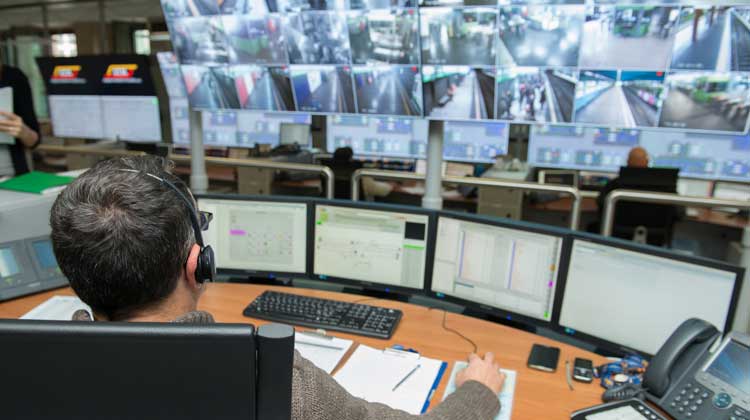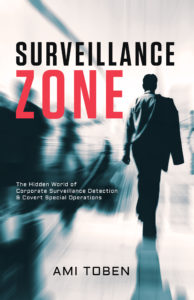
Author and security expert Ami Toben sets an intriguing stage in his book Surveillance Zone: The Hidden World of Corporate Surveillance Detection & Covert Special Operations. Although its opening is reminiscent of a James Bond movie, placing the reader right in the middle of a past security assignment, Surveillance Zone is much more than that. It’s a comprehensive primer for those interested in security issues and the profession surrounding it. The book is also a personal narrative that takes the reader from Israel to the United States and Japan, with stops in Canada along the way.
The impetus for the book was Toben’s blog Protection Circle. Launched in 2013, the site’s popularity exploded, and Toben said he was often asked when the book was coming out. “Once the blog reached something like 160,000 readers, I started kind of thinking, you know what, I think I might be able to pull this off, so I gave it a shot,” he said. The book was released in 2017.
Today, Toben is the director of consulting, training, and special operations for HighCom Security Services Inc., a San Francisco Bay-area firm that offers a full spectrum of protection services—from event and site security to individual protective services. Toben recently checked in with Homeland411 to talk about security specifics and reflect on his own experiences that have taken him around the globe.
Background, Training, IDF, and Martial Arts
Toben was born and raised in Israel, just about three miles from Lebanon. In the 1990s he was a tank commander in the Israeli Defense Forces (IDF). Though an Israeli native, his father was an immigrant from the United States and his mother from Montreal, so he retains both Canadian and American citizenship as well.
A martial arts aficionado from his late teens, he studiously followed that passion all the way to Japan after his IDF experience and ended up with two first-degree blackbelts after just two years. The details of his experience in Japan—as well as his rather unorthodox efforts to obtain a Japanese visa—are worth the read in Surveillance Zone.
After four years in Japan, an American college degree came calling, so Toben left Japan for the United States, and he settled in the San Francisco area. Although he thought he would return to Japan, his interest in Middle Eastern politics was again sparked. Based on Toben’s past experience, he chose a security career; he joined HighCom in 2004.
“The reason why I stuck with this, why I looked for this company specifically, is because the company was founded by an ex-Israeli secret service agent, a member of the Israeli Security Agency,” Toben said. “The company brought Israeli methods of terrorist activity prevention into the Bay area, into the local environment here, which is a very different environment from the Middle East.”
He noted that the market for the type of security is closely related to the ideas of homeland security—and experience with IDF and Israeli security provides an unmatched level of experience.
“The whole idea is the proactive, preventive approach that was developed in Israel in order to prevent terrorism rather than to counter it,” Toben said.
“We’re not talking about counterterrorism here; we’re talking about terrorist activity prevention, which I always explain is very different because the timeline is different.”
A major difference, he said, is the chronology. Being proactive means he’s dealing with what happens before an act and preventing the execution of  an event before it happens.
an event before it happens.
“A lot of people don’t realize that preventive measures are not targeting an attack; they’re targeting what comes before the attack, which is hostile planning,” Toben said. “When you start delving into hostile planning, you’ll start understanding that your main focus there is hostile surveillance—that might be the only part of the hostile planning process that is visible, if you know what to look for.”
The challenge, of course, lies in the fact that when it comes to surveillance, there’s typically nothing illegal or hostile about it. “It’s just a person sitting in a coffee shop,” he said. “That’s why the interesting thing about surveillance detection is that we’re not looking for illegal activity; we’re looking for indicators that somebody is planning an illegal act.”
But they don’t do it alone. The constant coordination with other organizations, government agencies, and protection professionals “adds a lot of spice to the mix,” he said. “So it’s even weirder when there’s law enforcement, executive protection, Secret Service, and State Department, and we’re in there as well, and everybody’s kind of trying not to step on each other’s toes, and some are trying to be nicer to others.”
Active Security Participation
Toben’s professional world includes security responsibilities for any number of events or individuals. But those responsibilities don’t stop with the security firms and organizations. Individuals partaking of a firm’s security expertise have responsibilities as well, and Toben particularly noted the importance of their involvement and cooperation to the success of any mission or event.
For the individuals Toben and his firm protect, he said the clients’ consciousness and awareness go a long way toward understanding threats. To help them better execute their responsibilities—whether it be a politician or Silicon Valley executive—acting within a secure framework is a shared responsibility.
“The most common mistake that people like us make is shocking them too much: ‘You have no idea how terrible he world is, and the world is dangerous, and you can die, and that’s the worst thing you can do!’” Toben said. “[The] idea is to find ways to explain it to them in a manageable way, in a way that will encourage them to take action rather than to shut down and not want to think about it.”
Once comfortable with the awareness aspect, individuals can begin to implement certain ideas and tactics that—in essence—increase their own security.
“Most of the difficulties with security-related issues is that security is very often inversely related with level of comfort and convenience and welcoming, and so-forth, because you’re putting [up] barriers and making people have to pass through filtration systems like access control,” he said. “There’s a certain level of instinctive resistance from people … it makes their life harder.”
Good Customer Service
An additional aspect is the relationship between increased security—from the perspective of those being protected—and the level of worry and/or inconvenience placed on others at an event or gathering. But Toben said that such concerns usually are unfounded, and people typically adjust to increased security or access control.
“I used to hear all the time that, ‘We want security, but we don’t want security officers to be seen outside, because then people will get freaked out,’” he said. “Nobody gets freaked out; some people ask some questions; you get an eyebrow or two raised, and that’s it.”
Toben made a particular point about security cameras. In decades past, security cameras were often equated to “Big Brother’s watching,” he said. With such cameras now ubiquitous—whether installed in public places or around private residences—the public’s comfort level with such things have changed.
More often than not, Toben said a primary aspect of his security experiences—particularly when out and engaging people on a job, gauging responses and getting close to people—is simply good customer service.
“It can give you very good ability to usher and to help people to get where they need to get, to get an event started on time,” he said. “It sounds almost backwards, but that’s what ends up happening a lot of the times. It’s a lot more organized and efficient.”
But each mission, of course, is different, and Toben illustrates a number of firsthand experiences within the pages of Surveillance Zone. Regardless of the story or situation, however, he returns to the core foundation of his work—and that of the people he protects—which is awareness.
“So the next time you’re out and about, give the hard working protective operators out there a polite nod of the head,” he concluded at the end of the book. “Don’t expect any of us to nod back, but depending on where you happen to be, you can definitely expect us to see it.”
© 2018 Homeland411
Click here to subscribe to the Homeland411 weekly newsletter.